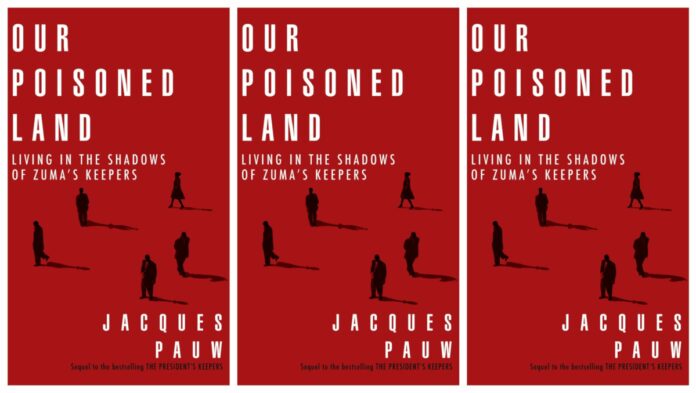In his compelling narrative style, Jacques Pauw picks up where he left off in The Presidents Keepers. Our Poisoned Land: Living in the Shadows of Zuma’s Keepers looks at the current criminal justice system and what went wrong. Pauw delves deep to find answers. Among his shocking findings are top police officers that had a hand in state capture still ensconced in the Hawks and police Crime Intelligence; a cabal of state-capture prosecutors within the NPA; a police minister cavorting with a convicted drug smuggler; and South Africa’s “own Guptas” living in the lap of luxury after the case against them “disappeared”.
An extract has been republished below with permission from the publishers.
Bheki Cele: The Cat in the Hat
The current state of policing and the rise in crime are arguably Ramaphosa’s single biggest failure as president. The crime rate spiked, units like Crime Intelligence remained in flux and some of South Africa’s very best law enforcers became casualties of the skirmish. Today, every South African feels as vulnerable and exposed as during the Zuma years of state capture.
When Bheki Cele first took office as national police commissioner in May 2009, he was initially credited with stabilising the crime rate. But in August 2010, the Sunday Times reported that billionaire businessman Roux Shabangu had clinched a dodgy R500 million property deal with Bheki Cele and the Department of Public Works for new police headquarters in Pretoria. The deal never went out to tender and it violated Treasury regulations.
Public Protector Thuli Madonsela found that Cele was guilty of improper conduct and maladministration in the police’s conclusion of the Pretoria and Durban lease deals with Shabangu.
Zuma appointed a board of inquiry into his fitness to hold office. Free State acting judge president Jake Moloi found Cele dishonest and unfit to hold office. Although Cele slammed Moloi and professed his innocence, Zuma had no choice but to fire him in June 2012.
***
Throughout the state-capture era and into Cyril Ramaphosa’s new dawn, the names of his police minister and that of a convicted drug dealer have been inexplicably linked: Bheki Cele and Timmy Marimuthu. The friendship between the two is, in some ways, reminiscent of the mutually corrupt relationship between Cele’s predecessor, Jackie Selebi, and his friend-with-benefits, Glenn Agliotti – also a convicted drug dealer.
Following Jacob Zuma’s sacking of his police commissioner, Bheki Cele found himself in the financial and political wilderness. Recently married and a father of five, Cele needed a benefactor to sustain his lavish lifestyle. Cele reportedly told people in private that, when he was down and out, Marimuthu was the only one who put food on his table. The convicted drug dealer allegedly diverted a portion of his fees that he earned as an informer from Crime Intelligence for Cele’s benefit. This lasted until Zuma appointed Cele as a deputy minister in 2014.
In his evidence before the State Capture Commission, a former accountant at Crime Intelligence’s secret account, Col. Dhanajaya Naidoo, said he had heard over time from several colleagues that Cele had awarded large contracts to Marimuthu that made him “very wealthy or extremely wealthy”. This evidence was repeated by Hawks investigator Col. Kobus Roelofse
The gravity of Marimuthu’s alleged felonious activity is contained in a 2011 top-secret Crime Intelligence profile, compiled during the investigation into him. The report stated that Marimuthu had Cele “on his books”. According to the report, Marimuthu had expanded his business interests to Mozambique, where he was involved in road construction. “Preliminary investigations reveal that Timmy is paying for pilot training for a person who will fly drugs from Mozambique into South Africa.”
In 2019, newly appointed Crime Intelligence boss Peter Jacobs descended on Marimuthu and his family, who had been appointed to positions within the unit and ordered them to report for duty. A secret Crime Intelligence report, the authenticity of which is beyond doubt, documented the reaction of the convicted drug dealer. Marimuthu peppered Bheki Cele with phone calls, and on 13 August 2019, he and his wife, Neermala, boarded British Airways flight BA6300 from Durban to Cape Town to see the police minister.
I don’t know if Marimuthu managed to have an eyeball-to-eyeball with Cele, but the report noted as well that “various high-ranking SAPS and government officials” frequently met Marimuthu at his villa in the exclusive gated suburb of Ilala Ridge in Umhlanga Rocks.
According to the note: “The contact further indicated that meetings took place in the lounge area and Timmy would hand over packages to certain officials as they were exiting. He suspected that the packages contained money.” The note mentioned that “one person that stood out according to the contact was Minister Bheki Cele” and that Marimuthu ordered that he be cooked a “special mutton curry”. The note added: “Timmy claims to have Bheki Cele in his back pocket and the minister is always at his beck and call.
There have been other curious events concerning Cele and Marimuthu. IOL and Independent Media newspapers said Marimuthu had been caught on tape advising Cele about issues concerning politics and drug operations in the city and in KwaZulu-Natal. In a recording made just before the December 2017 ANC conference at Nasrec, Marimuthu suggested Cele sideline certain top cops and advised him on which tenders to investigate. There is no doubt that the voices on the recording are those of Cele and Marimuthu. Neither has denied the conversation.
***
Ever since Judge Moloi found against Bheki Cele in 2012 for his part in property deals, Cele has vowed to clear his name. He submitted a review application against the findings of the Moloi inquiry. For the next six years nothing moved or happened. After Cele’s appointment as a deputy minister in 2014, everyone assumed that his review application had gone away. It hadn’t.
When the South African political landscape changed in 2018, Cele dusted off his review application. The new president was Cyril Ramaphosa, and although he was then technically the owner of the Moloi report, he was not going to oppose the application of an ally who had helped him come to power. He consequently withdrew as a respondent from the case.
The cat in the hat Cele was now, as minister of police, both a respondent and the applicant. The commissioner of police, over whom the minister held sway, was another respondent. Judge Moloi, who was the first respondent, had died in August 2017. There was therefore no one who opposed Cele’s application.
As an unopposed application, there were no legal arguments in court and a judge simply set the findings and recommendations of the inquiry aside. This meant that Zuma’s reasons for firing Cele had also been set aside.
Although Cele claimed to have cleared his name, he hadn’t. He has never taken either of the two public protector reports on review. The findings of Thuli Madonsela thus still stand.
The saga of the police property lease refused to die. In 2021, a letter from Accountability Now director Advocate Paul Hoffman SC landed on the desk of the head of the NPA’s Investigating Directorate (ID), Advocate Hermione Cronje.
Hoffman had brought the original complaint against Cele to the public protector after the story broke in the Sunday Times in 2010. The remedial action by the public protector is binding, and in this case she ordered the SAPS to investigate the leases to determine if any crime had been committed. In his letter of 2021, Hoffman demanded to know what had happened to the police investigation into Cele.
Cronje ordered ID investigators to find out the status of the investigation. The Democratic Alliance had laid criminal charges against Cele at the Claremont police station in Cape Town in August 2011. A docket was opened and transferred to the Hawks in Pretoria. There was no record that such a case existed, and it took investigators several months before they located the docket at the serious economic offences unit of the Hawks.
The investigating officer, a Hawks colonel, had in the meantime died. Much of the docket had been emptied. There were twelve affidavits from the investigating officer to obtain by subpoena the phone records and bank statements of Bheki Cele and Roux Shabangu. The phone records are still in the docket but have never been analysed. The bank records are gone.
Read more:
The President’s Keepers and state capture: black intellectualism needs to focus, please
The decade-old investigation against the Cat in the Hat will have to begin afresh. Does the ID have the resolve to investigate the minister of police? Although the NPA is legally shielded from government meddling, many of the directorate’s investigators are members of the Hawks who have been seconded to the prosecuting authority.
Fifteen years ago, the Scorpions confirmed their independence and their commitment to upholding law and order when they brought to book Jackie Selebi, a close ally of President Thabo Mbeki, for corruption and bribery. Are we now in 2022 at a crossroads and will the Investigating Directorate stand up not only as an instrument to smash state capturers and their enablers, but also as a future force to guard the nation against grand-scale venality?
Our Poisoned Land is published by Tafelberg and is available in all good bookstores.









